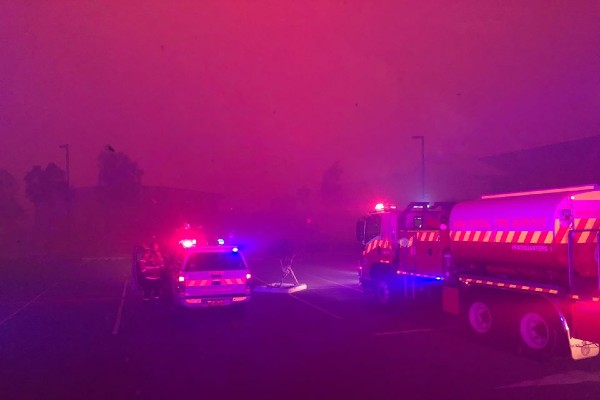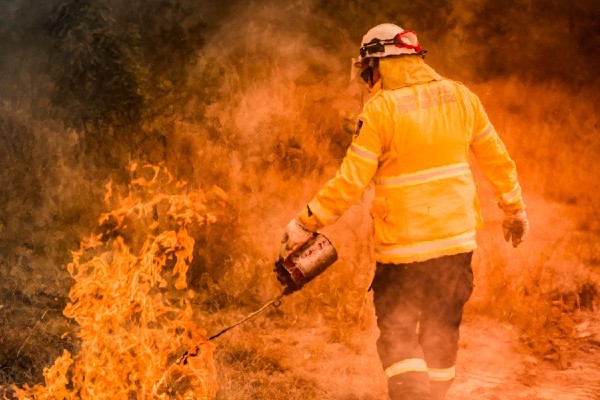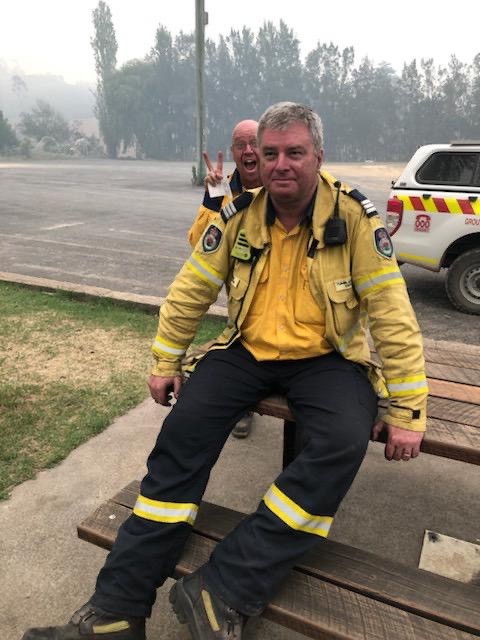Get your FREE 30-day trial.
Start by selecting a product:
On first impressions John Watson is like any other Salesforce employee. But as a volunteer NSW Rural Fire Service (RFS) Brigade Captain John has spent his summer fighting the Australian bushfires that have devastated the country. Here, John shares his story of what it’s like being on the front line and how you can help.
It’s been a heartbreaking summer. The destruction wrought by the bushfires has been staggering. As a volunteer ‘firey’ I’ve seen it up close.
Over these past months I’ve also seen immense courage, generosity and optimism.
I’ll never forget either.
The work of a volunteer fire brigade is built on teamwork, strategy, trust, hard work and a sense of purpose. It might look chaotic on your TV screen, but fire fighting is extremely calm, methodical, structured, fact-based work. We have to make very black and white decisions: “we can save that house, but we can’t save that one”.
If you’ve heard some of the clips of firefighters in their trucks driving through what looks like the apocalypse, then you’ve probably been amazed at how calm and organised they sound.

As a Brigade Captain, I manage 40 to 50 people and do a lot of administrative and operational work on top of the actual firefighting. At that level, volunteering isn’t a casual commitment. It’s more like a second job. There is something on every day – lots of training, lots of recruitment, lots of fundraising. It’s good to be able to help people on their worst day.
The technology today makes staying in contact with my Salesforce work much easier and we are set up better than most organisations when it comes to tools and systems. I’ve had customer meetings when I’ve been sitting in the fire truck!
But sometimes you’re just completely without comms. Most people are pretty understanding – they’ve seen what’s happening and they know what’s important. Often I can schedule my work week based on what I see happening with the weather forecast. But sometimes I just have to send an apology email at 2am letting people know I won’t be around for the rest of the week.

Obviously this has an impact on my work, but with Salesforce increasing its paid volunteer time off (VTO) from seven to 27 days a year for staff assisting with the bushfire recovery, the company is clearly prepared to support this time away from the office. Without VTO and Salesforce’s Uncapped Emergency Service Leave, I’d be taking unpaid leave or eating into my holidays. I’ve seen the financial and emotional toll on firefighters who don’t have a company that supports them or who are in a small business or self-employed. They use up leave, they use up holidays, they miss time with their families. People give up a lot to be able to do this work.
My own daughter is a volunteer firefighter too which makes me incredibly proud and, of course, concerned. I hope the younger generation of volunteers coming through don’t have to do as much firefighting, but unfortunately that’s unlikely to be the reality. So mostly I hope they can do this work with even better resourcing and planning.

When you’re working with a crew who are all from the same brigade, you don’t have to talk much. You’ve all done it a hundred times before and it’s seamless. The team just knows what to do. A lot of it is very physically demanding but we have techniques and skills to minimise that physical effort.
And there’s amazing trust across the services. Everyone mucks in together and takes guidance from whoever has the best, most relevant expertise at the time, whether that be Fire Rescue, RFS, National Parks or State Forestry. We recognise when someone has a particular skill set to offer, and we listen.
From cases of beer left on our truck to meals left outside the station, we’ve been on the receiving end of really generous and thoughtful gestures and contributions. Financial donations to our brigade alone have meant we can buy iPads to help us navigate. Certainly we’d encourage people to donate to the charities that can most effectively distribute funds.
Anyone wanting to volunteer would be welcomed by a great group called BlazeAid that’s helping to rebuild infrastructure with a focus on farming in rural communities. They’d love people to participate for two to four days. You don’t need to be skilled. They just need people.
Rebuilding will be about human power, getting out there and working together. And it will take years. I know from having attended fires in towns like Pappinbarra (north of Port Macquarie), which burned in 2018 and end of 2019, that recovery is a long haul.
And in a few months’ time, take a week’s holiday down the south coast. Go with an empty car. Buy your fresh fruit from stallholders on the roadside. Get your groceries from the local shops. Stay in a cabin or a motel. Let’s be there for these communities once the dust and the ashes have settled.
Want to help? Consider supporting the following organisations:
Contact your local brigade about how you can support them and their volunteers.